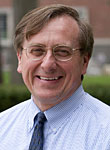Among next provost's priorities: Boosting academics and encouraging optimism
By Susan Kelley

Among the top priorities of Cornell's next provost, W. Kent Fuchs (pronounced "Fox"), when he takes up the post Jan. 1 will be to bolster individual academic departments and to encourage optimism across campus.
"I will have a slightly different focus than we've had as an institution explicitly in the past 10 years," said Fuchs, the Joseph Silbert Dean of Engineering at Cornell since 2002, in an interview Oct. 21. "The department and school are the academic home for faculty and students, and it's where teaching occurs and scholarship is conducted. My personal goal is to understand the aspirations of the faculty and students in those departments, to encourage departments and schools to develop plans -- explicit aspirations -- and make sure that the provost's office is supporting them," he said.
"We will also continue to encourage and enable interdisciplinary and cross-college collaboration and in particular to support important centers and institutes."
Announcing Fuchs' appointment in his State of the University address Oct. 17, President David Skorton praised Fuchs' "great knowledge of Cornell, strong leadership abilities and clear vision of the future." He also thanked Deputy Provost David Harris "for serving so effectively as interim provost during the past several months." Harris will resume his deputy provost position Dec. 31.
While the new provost's long-term focus will include leading efforts to implement Cornell's strategic plan, among the issues that will take his immediate attention will be careful understanding and management of the budget in the midst of economic uncertainty. In this, he said, it is important to include Weill Cornell Medical College and the rest of Cornell's New York City campus in leading and planning on budget issues as one institution.
He also discussed the importance of working to enhance undergraduate financial aid. In his address, Skorton committed to raising an additional $125 million for undergraduate financial aid, increasing the campaign goal for undergraduate scholarships to $350 million from $225 million. "The fundamental point is to call upon our donors to increase their philanthropy so that we can grow our endowment for financial aid," Fuchs said, "and in the meantime to work with all of those who oversee the budget to determine how we can reallocate resources to financial aid."
However, he said, the current worldwide economic crisis may delay some of Cornell's important initiatives, such as new facilities projects that have not yet begun. Yet the crisis does offer Cornell a competitive advantage in recruiting diverse, outstanding faculty and students. "That has to be at the top of our priority list regardless of other projects that may get delayed," Fuchs said. "It's actually a great opportunity and allows us to also renew the focus on those academic areas that are the highest priorities -- and to make progress, particularly relative to our competition."
Fuchs' engineering background will influence his take on the provost's post. As the engineering dean, he introduced a model of planning and evaluating progress that he would like to scale up to the campus level. Departments created goals and strategies and timelines to achieve them, which informed the college's goals. Campuswide, he would like to see schools and colleges develop ways to chart progress toward their goals. "It's important that we have a clean set of metrics for measuring success and then being accountable as we move forward," Fuchs said.
But it is not planning, but realistic optimism and transparency that he points to as his most important contributions as dean, two values, he noted, that he shares with Skorton. "The college has a strong sense of enthusiasm for the future, of which I'm immensely proud." He fostered this optimism, he said, by trying to model it. "I am constantly reminded of how blessed we are to be at Cornell and how much progress has been made across the university in recent years."
Besides engineering, Fuchs will bring his master's of divinity studies to the new job. The three-year graduate program reinforced his focus on service to people. "The combination of focusing on people and service to others is what is truly important. It's the faculty, staff and students who give us our excellence and the community we call Cornell." The seminary, he recalled, also broadened his appreciation of the social sciences, humanities and the arts and honed such personal skills as public speaking.
As Cornell's 15th provost, Fuchs will succeed Carolyn Martin, known as "Biddy." She held the position for eight years -- the longest term for any provost in Cornell history -- before accepting the chancellorship of the University of Wisconsin-Madison in May. "I go by Kent. I never had a nickname," Fuchs said with a laugh. "And I'm not sure I want to start one."
Media Contact
Get Cornell news delivered right to your inbox.
Subscribe